There
is always hope.Anxiety and Depression blinds us to that
fact.
If we can somehow hold on to our hope, just
maybe we can find a way to get through
. Here
is a possible Way?
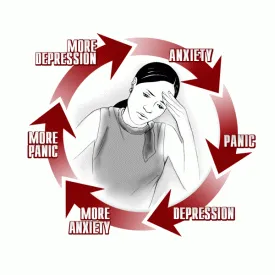
Without emotion, man would
be nothing but a biological computer. Love, joy,
sorrow, fear, apprehension, anger,
satisfaction, and discontent provide
the meaning of human existence.
Arnold M. Ludwig---1980 |
First I want to warn you: this is a somewhat
long letter.
If I could tell you all I need to in just a few words, believe me, I would.
Anxiety and depression are the most widely
experienced negative states. Researchers at the
Institute for behavior and health, inc.,
Studied the cost in dollars of anxiety disorders in one
year(1990) including costs of treatment and reduced or
lost productivity. They reported that anxiety disorders
alone (including generalized anxiety, simple phobias
,panic disorder, social phobia and obsessive-compulsive
disorder) cost the United States some $46.6 billion
dollars.
An inexpensive and effective treatment that could alleviate
or eliminate disorders clearly could have an enormous economic
and social impact on our future.

We all know the external signs of anxiety:
sweaty palms, tight chest, pounding heart, erection problems,
Butterflies in the stomach, restlessness, irritability,,
trembling hands, dread, feelings of being out of control
Or impending panic…
Some of the brain events and patterns characteristic of
anxiety include: decreased alpha and theta brain waves
(suggestive of decreased relaxation and calmness); increased
high beta activity (suggestive of Heightened arousal) ;
rapid shifts in brain waves and absence of brain-wave synchrony
(suggestive of Uncoordinated and agitated thought processes)
; elevated levels of stressful and excitatory biochemicals
Including high amounts of epinephrine (adrenaline) ACTH
and cortisol.
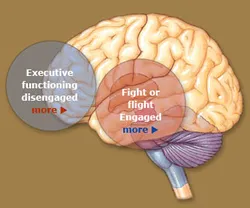
Both outwardly and inwardly, then, anxiety shares many
of the features of the fight-or- flight response. This
evolutionary hard-wired program responds automatically
to a perceived threat by activating our sympathetic nervous
system. In an adrenaline rush we pour out neurochemicals
that accelerate our metabolism in various ways, all of
them intended to help us deal with some external threat
by running like hell or ripping its liver out with our
teeth.
One curious
quality of anxiety is that, since the external
threat is not present, our attention
and fear
become focused on the symptoms of the anxiety itself.
Thus we begin to fear that because our breathing
is constricted, we will stop breathing; that
because our
heart is thumping, we will have a heart attack;
and so on. A quick way to stop anxiety is to
turn our attention
away from it. You may have had the experience of
suffering anxiety and then being distracted by
something more
urgent. By the time you remember how anxious you
were, your anxiety has gone. Anxiety is a response
to a perceived
threat; it makes sense that if we forget about
or have our attention diverted from the threat,
then the physiological
symptoms will disappear quickly. |
When the external threat exists, our response is called
fear. In its most irrational and exaggerated form, this
fear can become phobia. We can respond to an external appropriately
and then after
Activating and using our fight-or-flight response, we can
relax and allow our body to activate the relaxation response.
During the relaxation response the effects of the fight-flight
response are terminated and erased
And the stress-related biochemicals and their byproducts
are normally cleaned out of the system
I just want to let you know how
things are at the moment. As we discussed I have been
battling depression and various issues for such a long
time and tried many things,
I have been using the Bt11 for 6 months and have found
it to be so useful. It is so unobtrusive that I can walk
down the street, do my shopping ,go to the library and
not draw any attention to myself and still continue receiving
the benefits.
I have found that it helps a great deal with those
negative thoughts and “black Clouds”that
make my days a struggle. I have found relief and spaces
were the sun
shines through and none of the negative side effects
I experienced while using medication.
R Thomas Montana |
BUT in anxiety, the threat is internally created: We are
distressed by some potential or future event
And since there's no way to fight or flight or flee a potential
or future advent, we are left in a state of arousal. We
are still feeling the threat, but there is no way to escape..
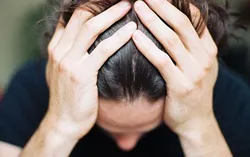
One way to escape anxiety is simply to turn off the physiological
symptoms of the fight or flight response, like turning
off a faulty warning signal on a machine. This seems to
be one of the ways in which brain technology works so effectively
to alleviate anxiety: clearly mind tools have powerful
and in many cases unsurpassed effects in rapidly producing
deep relaxation by switching on the relaxation response.
Try to imagine being profoundly relaxed and experiencing
anxiety. It's probably hard for you to do. There's evidence
that deep relaxation and fear are mutually exclusive, when
you are experiencing one, you cannot truly experience the
other. So, to the degree that you permit brain technology
to relax you, it will eliminate anxiety.
Hello,
Many thanks for the Bt unjt. My husband has
given me quite a lot of feedback. Specifically
he said
that he had noticed that my anxiety levels don’t
seem to be as high and the amount of control over
my circling thoughts has become lots stronger. I
know that I can often see when they start and can
short circuit them (haha) by using my unit. It is
great being able to enjoy the time we have together
more,
Rose Chavez Arizona |
The image of flipping a switch switching off your fight
or flight response and switching on your relaxation response,
may seem like an oversimplification. But there is evidence
that there may be a sort of "master switch" in
the brain that turns on either the sympathetic or the parasympathetic
system. According to cranial electrostimulation (CES) inventor
and researcher Daniel Kirsch, CES produces "a direct
stimulation of the autonomic nervous system" that
can act "sort of like switching on the relaxation
response. And CES researcher Ray Smith, describing a study
of people who suffered from phobias, told me with astonishment
that "what we found, essentially, was that the CES
blocked the subjects' ability to feel fear altogether!
This suggests that the old brain… including the hypothalamus
and amygdala, governing memories and emotional expression,
is the area affected by the electrostimulation." What
Smith found, in other words, was that stimulation with
CES essentially switched off fear, or the fight or flight
response.

Of all the mind tools, Cranial electro stim (CES) is currently
the most widely used for treatment of anxiety. As a result
of numerous
rigorously conducted scientific studies, CES is recognized
by the Food and Drug Administration (FDA) as effective
in treating anxiety. One recent survey of over
150 doctors and patients showed that more than 98 percent
of the patients
being treated for anxiety with CES showed improvement;
over 70 percent showed "marked improvement" or
complete recovery. Controlled studies by researchers measuring
state and trait anxiety have consistently shown that CES
produces dramatic improvements in both.
Depression

Lately Melissa hasn't felt like herself. Her friends
have noticed it, too. Lita was surprised when Melissa
turned down her invitation to go to the mall last Saturday
(Melissa could always be counted on for Retail Therapy!).
There was really no reason not to go, but Melissa just
didn't feel like it. Instead, she spent most of the
weekend sleeping.
Staying in more than usual isn't the only change
in Melissa. She's always been a really good student.
But over the past couple of months her grades have
fallen and she has trouble concentrating. She forgot
to turn in a paper that was due and is having a
hard time getting motivated to study for her finals.
Melissa feels tired all the time but has difficulty
falling asleep. She's gained weight too.
When her mother asks her what's wrong, Melissa
just feels like crying. But she doesn't know why.
Nothing particularly bad has happened. Yet she
feels sad all the time and can't shake it.
Melissa may not realize it yet, but she
is depressed.
My wife and I would just like to pass on
our thanks to you people for making this little
unit available. Our daughter is slowly but
noticeably turning the corner and is able now
to recognize that she does have a role to play
and that she can be strong enough to work her
way through this awful state of depression.
We would also like to thank you for the time
you took to talk to us and let us know that
there is a way forward.
John Tine Iowa |
|
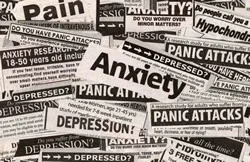
What causes
depression?
Sometimes friends or family members recognize
that someone is depressed. They may respond with
love, kindness, or support, hoping that the sadness
will soon pass.
But not everyone recognizes depression when
it happens to someone they know.
Some people don't really understand about
depression. For example, they may react to a
depressed person's low energy with criticism,
yelling at the person for acting lazy or not
trying harder. Some people mistakenly believe
that depression is just an attitude or a mood
that a person can shake off. It's not that easy.
Sometimes even people who are depressed don't
take their condition seriously enough. Some people
feel that they are weak in some way because they
are depressed.
|

Being clinically depressed is very different from
the down type of feeling that all people experience
from time to time. Occasional feelings of sadness
are a normal part of life, and it is that such
feelings are often colloquially referred to as "depression." In
clinical depression, such feelings are out of proportion
to any external causes. There are things in everyone's
life that are possible causes of sadness, but people
who are not depressed manage to cope with these
things without becoming incapacitated.
As one might expect, depression can present itself
as feeling sad or "having the blues".
However, sadness may not always be the dominant
feeling of a depressed person. Depression can also
be experienced as a numb or empty feeling, or perhaps
no awareness of feeling at all. A depressed person
may experience a noticeable loss in their ability
to feel pleasure about anything. Depression, as
viewed by psychiatrists, is an illness in which
a person experiences a marked change in their mood
and in the way they view themselves and the world.
Depression as a significant depressive disorder
ranges from short in duration and mild to long
term and very severe, even life threatening.

Depression involves the brain's delicate chemistry — specifically,
it involves chemicals called neurotransmitters.
These chemicals help send messages between nerve
cells in the brain. Certain neurotransmitters regulate
mood, and if they run low, people can become depressed,
anxious, and stressed. Stress also can affect the
balance of neurotransmitters and lead to depression.
The most common drugs used
today to treat depression focus their attention
on the brain chemicals, serotonin and norepinephrine.
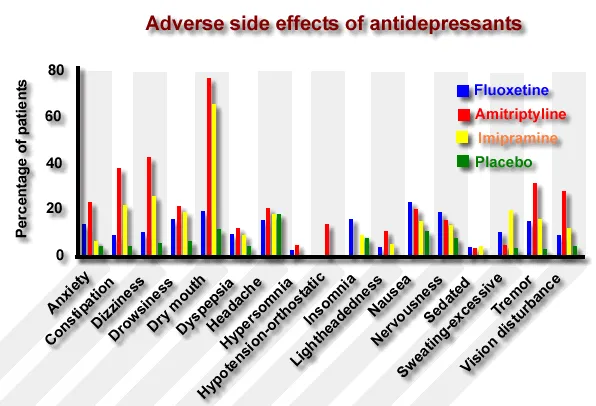
Adverse
side effects of antidepressant drugs
Increasing evidence, however,
now indicates that another player in the brain,
corticotropin-releasing factor, should share
the spolight. Studies have shown that abnormally
high activity of this stress hormone is present
in many cases of depression. Furthermore, research
shows that drugs that block the action of corticotropin-releasing
factor have the potential to lift the dismally
low spirits of the depressed. The new insights
help explain how depression arises and may lead
to new options for prevention and treatment.BT9
 |
Depression and Stress Hormones
The most common drugs used today to treat
depression focus their attention on the
brain chemicals,
serotonin and norepinephrine. Increasing
evidence, however, now indicates that another
player in the brain, corticotropin-releasing
factor, should share the spotlight. Studies
have shown that abnormally high activity
of this stress hormone is present in many
cases of depression. Furthermore, research
shows that drugs that block the action
of corticotropin-releasing factor have
the potential
to lift the dismally low spirits of the
depressed. The new insights help explain
how depression
arises. |
|
It is important for people
to know that:
Depression is an illness that
can affect anyone at any age.
It is not connected with and does not develop into insanity |
SYMPTOMS
OF DEPRESSION
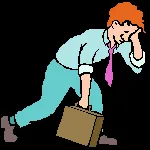 |
An estimated one in
ten Americans suffer from depression, an
illness that affects both physical and mental
well-being. Often chronic in nature, depression
can be triggered by adverse life circumstances
or occur simply "out of the blue." Frequently,
a combination of genetic, psychological and
environmental factors contribute to the onset
of depression.
Depression is much misunderstood by the public, yet it affects
many people of all ages. It is estimated that one in five people
will suffer from depression at some point in their lives.
Depression
Scale |
I wish that I had become aware of this helpful
technology before our beautiful girl Kate, had
decided that she could not cope in this world
any longer.
However, because of our experience we have become
involved with a number of young girls whose life
path was painfully similar to hers. We have used
the BTPlus with such a great effect that I have
no hesitation in saying that it has been a big
part of them developing a stronger base when
things get tough. The ease of just popping on
the earclips and turning the unit on allows them
to intervene quickly when they identify a rough
patch. Once again thank you and please continue
the research.
Joan Baily UK |
Depression is an illness where the feelings of
hopelessness and helplessness, linkled to the inability
to concentrate, may make it hard for some people
to carry out normal daily activities.
Depression is an illness with a wide range of physical and psychological
symptoms, which sometimes make it hard to recognise and understand.
Personality may play a part in depression. Although anyone can become
depressed under particular circumstances, some people seem to be
more vulnerable than others. This may be because of things that have
happened in childhood, such as abuse, or because of our individual
make up (including body chemistry).
A lot of effective, intelligent and creative people suffer from depression
and yet make an outstanding contribution to life. Often, information
about their depression is only revealed after their death, as people
misunderstand the illness. Amongst such people are
 Florence
Nightingale and Florence
Nightingale and
 Sir
Winston Churchill, who used to call depression
his "black dog". Depression can effect
anyone and does not reduce your value as a
human being. Sir
Winston Churchill, who used to call depression
his "black dog". Depression can effect
anyone and does not reduce your value as a
human being.
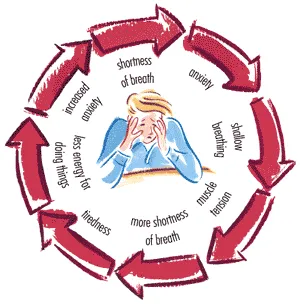
The most common
symptoms are set out below . If these have been
experienced for more than two weeks it is essential
to seek help. People may suffer from two or three
of these symptoms but are unlikely to experience
them all.
 Feelings
of helplessness and hopelessness. Feelings
of helplessness and hopelessness.
 Feeling
useless, inadequate, bad. Feeling
useless, inadequate, bad.
 Self
hatred, constant questioning of thoughts and
actions, an overwhelming need for reassurance. Self
hatred, constant questioning of thoughts and
actions, an overwhelming need for reassurance.
 Being
vulnerable and "over-sensitive". Being
vulnerable and "over-sensitive".
 Feeling
guilty. Feeling
guilty.
 A
loss of energy and motivation, that makes even
the simplest tasks or decisions seem difficult. A
loss of energy and motivation, that makes even
the simplest tasks or decisions seem difficult.
 Self
harm. Self
harm.
 Loss
or gain in weight. Loss
or gain in weight.
 Difficulty
with getting off to sleep, or (less frequently)
an excessive desire to sleep. Difficulty
with getting off to sleep, or (less frequently)
an excessive desire to sleep.
 Agitation
and restlessness. Agitation
and restlessness.
 Loss
of sex drive. Loss
of sex drive.
 Finding
it impossible to concentrate for any length
of time, forgetfulness. Finding
it impossible to concentrate for any length
of time, forgetfulness.
 A
sense of unreality. A
sense of unreality.
 Physical
aches and pains, sometimes with the fear that
you are seriously ill. Physical
aches and pains, sometimes with the fear that
you are seriously ill.
In severe depression, these feelings
may also include:
 Suicidal
ideas. Suicidal
ideas.
 Failure
to eat or drink. Failure
to eat or drink.
 Delusions
and/or hallucinations. Delusions
and/or hallucinations.
How
may I measure my depression?
|
 HELP
DEPRESSION  WEIGHT LOSS WEIGHT LOSS
 STIMULATE YOUR MEMORY STIMULATE YOUR MEMORY
 GIVE UP SMOKING GIVE UP SMOKING
 HELP SLEEP PATTERNS HELP SLEEP PATTERNS
 HELP ANXIETY HELP ANXIETY
 HELP PANIC ATTACKS HELP PANIC ATTACKS |

Get Your Life Back
On Track
Imagine plugging your brain
into a specially mastered Black box containing
a powerful (but absolutely safe) technology
that launches you into an incredible experience
of deep inner peace - an experience of deep
meditation so powerful...it immediately begins
to create profound, positive changes in the
structure of your nervous system... |
Everyone has a threshold for what they
can handle coming at them from the world. When that
threshold is exceeded, we attempt to deal with being
pushed over it with a variety of coping mechanisms,
including anxiety, anger, depression, overwhelm,
sadness, substance abuse, and many others.
When a person has trauma during childhood,
this threshold ends up being lower than if the trauma
had not happened, and the person is more often bothered
by things in their environment that might not bother
other "normal" people. This means they
exhibit, and suffer from, the above feelings and
behaviours more often. But even the person with the
normal threshold can be pushed past their threshold
from time to time, depending on what’s going
on for them.
Hi you guys :)
Been a while so thought I would give you
an update. I haven’t been in touch much because
I have been studying and trying to make up
for the lost time. I think last time I had
fallen so far behind that I had given up and
was about to drop out of college. I have been
using the BTPro and it has been great – so
effective and so easy to use and only those
people who I have confided in know that I am
actively fighting that horrible black dog – depression
and addiction- when they see the earclips.
Its great – takes me right away from
any sort of chemical use and still makes
me buzz and participate in the life around
me.
Oh by the way I think I could do with an
new set of earclips. could you get some out
to
me as soon as possible please
Janelle Benventa Califonia |
The solution to all of this? Raise this threshold
higher, and this is precisely what the BT 9 does.
As this happens, your dysfunctional feelings and
behaviours happen less and less often because it
becomes less and less likely that whatever is happening
in your environment will push you over it and trigger
these feelings and behaviours in the first place.
As a result, they fall away — for good.

DRUGS,
DEPRESSION, SMOKING
This is a lot like an athlete who begins with a
certain physical threshold, but raises it by training
every day until what would have overwhelmed the person
in the beginning becomes easy.
"I noticed effects
from the first day od using my BT9. I experienced
a greater
sense of well being, I experienced a sense
of euphoria and also a sense that finally
I HAD found something that is making changes
to me and is living up to the facts.."
John Gardiner Utah |

Cranial
Electrotherapy, a Profound Alternative Therapy
C.E.S.- SAFE EFFECTIVE ALTERNATIVE TO DRUGS IN THE
TREATMENT OF DEPRESSION .
Cranial
Electrotherapy Stimulation (CES) is an FDA
approved treatment for depression .. Over 100 human
and eighteen animal studies have demonstrated the
effectiveness of CES in treating these and other
disorders. CES involves the introduction of a very
weak electrical current into the brain. Before you
say, "No way! Not my brain!" understand
CES is not "Shock therapy". The electrical
current used in CES/BT9 is
typically less than one milliampere. To put this
in perspective, the current needed to power a light
bulb is about 11,000 times stronger. No serious side
effects have been reported with CES.
Cranial
Electrostim FAQ
CES is not only a drug-free treatment of these
conditions but is more effective than drugs currently
on the market, with none of their frequently debilitating
side effects.
Homeostasis can be defined as the tendency for intrinsic
balance within a system. Application of a therapeutic
range of microcurrent intracranially seems to enhance
the homeostasis of the biological central nervous
system. A change in one system within the individual
will have correlative effects upon other systems.
Improvements in mood, cognitive function, self image,
shift of locus of control to oneself, and sense of
well being can be measured. When CES/BT9 works, it
enhances one's ability to handle or deal with situations
that were previously beyond the range of one's control.
Depression
Scale
Electromedicine including
CES is designed to primarily impact the
electrical
nature of the body. The current used in CES
is very similar to the electrical fields
naturally present in the body |

The efficacy of CES has been demonstrated in many
different ways. Studies have used twenty-seven different
psychometric (pencil and paper) tests including the
Minnesota Multiphasic Personality Inventory and the
State/Trait Anxiety Inventory. CES has consistently
demonstrated reductions in anxiety on these tests.
Other studies have measured the physiological manifestations
of anxiety before and after CES treatment. Slowing
of brain waves and respiration rate, as well as reduction
in blood pressure are physical signs of stress reduction
that have been documented with CES treatment. One
placebo-controlled study evaluated the effects of
CES treatment in twenty individuals with chronic
stress symptoms of at least a year's duration. All
of them had failed to respond to medication. Muscle
tension, heart rate and finger temperature were measured
before, immediately after, and one week following
a single twenty minute CES treatment. Muscle tension
and heart rate decreased and finger temperature increased
immediately after treatment in those receiving active
CES treatment but not in the placebo (sham CES) group.
One week after treatment, those who had received
active CES treatment still had significantly reduced
muscle tension and heart rate! This is one of the
many advantages of CES over medications. Whereas
medications only work as long as they are taken,
CES effects are long lasting and cumulative.

You don't have to be "sick" or "stressed-out" to
use CES and realize its benefits. CES
is a life-enhancing instrument of potential value
to everyone. Its uses are wide ranging. Some people
use it as an adjunct to meditation practice each
morning. Others during peak stressor moments that
hit unexpectedly in the course of a day. Who hasn't
experienced those times when we are about to "lose
it?" Putting the unit on in these situations
even just briefly--perhaps for as little as ten
minutes-- can help curb that anxiety and serve
as a reminder that one needs to be with ones self
in a different way.
CES also represents a significant affirmation
that you have the power within to change your mental
state and that you are willing to take active steps
to create the time and the space to do so.
Using waveforms
at a level of current similar to the body's own,
MET bridge cellular communications help re-establish
the normal electrical flow.
CES
FAQ
(frequently asked questions)
Anxiety
and depression are the most widely experienced
negative states
One curious quality of anxiety is that,
since the external threat is not present, our attention
and fear become focused on the symptoms of the anxiety
itself. Thus we begin to fear that because our breathing
is constricted, we will stop breathing; that because
our heart is thumping, we will have a heart attack;
and so on. A quick way to stop anxiety is to turn
our attention away from it. You may have had the
experience of suffering anxiety and then being distracted
by something more urgent. By the time you remember
how anxious you were, your anxiety has gone. Anxiety
is a response to a perceived threat; it makes sense
that if we forget about or have our attention diverted
from the threat, then the physiological symptoms
will disappear quickly.
Anxiety

Anxiety reduction
is usually felt during the first treatment although
the effects are cumulative over time. Depression
and insomnia are usually controlled, if not cured,
in two to three weeks. Users also report feeling
more energetic, focused, and, well. Although not
its primary mechanism of action, microcurrent treatment
Increases natural endorphin output
ANXIETY,
DEPRESSION, SMOKING
Affectiveness of the NET or Brain Tuner device was
established by a Chinese Acupuncturist, Dr. Wen,
in Hong Kong in the 1970s by testing hundreds of
patients at a clinic, most of whom were on drugs
of one kind or another, alcohol, nicotine, heroin,
etc, consciously or unconsciously trying to relieve
stress, largely a mental condition?
It seems that the body -- or Brain -- gives up making
its own pain-killers, Endorphins, when a person turns
to drugs;
but putting a weak EM signal into the; body, especially
the head area, stimulates the brain into producing
Endorphins again. Amazingly, the craving for the
drug disappears in three to ten days and without
withdrawal symptoms!
The Brain Tuner (BT-9) uses a complex waveform that,
according to Beck, produces many frequency harmonics
simultaneously—"all known beneficial frequencies
for the natural stimulation of the brain’s
neurotransmitters." …
CES
devices that have helped innumerable people
with Anxiety and Depression
BT Pro Master
Unit
BT
Pro Multi system
 Built
in frequencies Built
in frequencies
 0.5
Hz 0.5
Hz
 1.5
Hz 1.5
Hz
 5.0
Hz 5.0
Hz
 7.83
Hz 7.83
Hz
 10
Hz 10
Hz
 100.00
Hz 100.00
Hz
Plus many more built in frequencies
and options
 Plus
the Full BT6-BT11 Beck Protocol Plus
the Full BT6-BT11 Beck Protocol
 Over
500 Natural Harmonic frequencies Over
500 Natural Harmonic frequencies
 Fully
Rechargeable Batteries Fully
Rechargeable Batteries
 Charger
(included),,and the charger is sent for the
voltage of your
country Charger
(included),,and the charger is sent for the
voltage of your
country
 LCD
Screen LCD
Screen
|
|
Bio-feedback
Option
There is a relationship between
Stress and the Electrical conductivity of
the skin. This is known as Galvanic Skin
Response or GSR. . More
|
Free
Option allows one to measure GSR
Skin conducts electric current
like a Resistor. The resistance of Skin can
vary from 25 Kilo Ohms to 2 Mega Ohms depending
on the Emotional state (This varies from
person to person ).This variation is due
to the changes in the permeability of the
skin. In a normal fully relaxed person, skin
resistance will be around 2 Mega Ohms. This
is due to the low permeability of the skin.
Skin offers high resistance and restricts
the current flow. But if the same person
is in stress, his skin resistance reduces
to 25 Kilo Ohms or less due to leakage of
water from the blood vessels and subsequent
sweating. This increases the electrical conductivity
of the skin. Thus the electrical conductivity
of the skin and Stress are directly related
BT
Pro Unit with Bonus
More
Information and Add on Options
|
|
|

